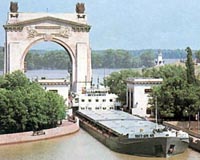 |
Ankara, Turkey (UPI) Jul 14, 2009 A major 1,800-mile pipeline to bring gas from the Caspian Sea and the Middle East to Europe, while bypassing Russia, has been given a formal green light by the five states it will cross. An intergovernmental agreement to promote the Nabucco pipeline's construction has been signed in Ankara by Turkish Prime Minister Recep Tayyip Erdogan and his counterparts from Bulgaria, Romania, Hungary and Austria. Hailed by some as a way to free Europe from excessive dependence on Russia as source of energy -- Russia currently supplies more than 40 percent of the natural gas it consumes -- the project is strongly backed by the European Commission, whose president, Jose Manuel Barroso, attended Monday's signing. But critical questions remain unanswered: What markets will Nabucco serve, how soon it will be built, how will financing be arranged, and, most crucially, where will the gas come from to fill the new pipeline? Officially, Nabucco is due for completion in 2014 at a cost of 8 billion euros with an ultimate capacity to transmit 31 billion cubic meters via Turkey to Eastern and Central Europe, where it will connect to the Western European gas grid. That corresponds to about 10 percent of current imports. But with European gas demand rising and domestic production in decline, imports are generally projected to grow from about 300 bcm now to some 500 bcm over the next 10 to 15 years. Up to a quarter of that gap should be filled by increased exports from Russia via the Nord Stream pipeline under the Baltic Sea. Now under construction from Western Russia to Northern Germany and due for completion in 2012, Nord Stream is backed and financed by Russian state-owned Gazprom, two German utilities and the Dutch state utility Gasunie, giving rise to widely expressed fears that Europe will become overly energy-dependent on Russia. Some Western observers view Nabucco as an important strategic counterweight to Nord Stream and a way to forestall the South Stream pipeline project that would bring even more Russian gas across the Black Sea to eastern and southern Europe, tightening Russia's hold on European energy supplies. After many years of complex governmental negotiations, Nabucco acquired new political impetus when Russia's ongoing dispute with Ukraine over gas pricing and the payment of past debts culminated in January in supplies to many European countries being reduced or cut off in the depth of winter. Bulgaria's prime minister acknowledged in Ankara that reducing its 100 percent gas dependency on Russia was a major factor in his country's support for Nabucco. Analyst Jonathon Stern, director of gas research at the Oxford Institute for Energy Studies, sees Nabucco as a long-term complement rather than a short-term rival to Nord Stream as a supplier of natural gas to European markets, but it is currently caught in a Catch-22 position. In spite of seed money from the European Commission and a pledge from the European Investment Bank to contribute funds, financing Nabucco will require secure consumer offtake commitments. These will not be forthcoming until it is clear where Nabucco's gas will be sourced. Stern believes Nabucco will eventually be built, but not until the late 2010s or early 2020s. Azerbaijan, tagged as a major supplier, has agreed sales contracts with Russia's Gazprom that may account for half its available supplies. Turkmenistan, Kazakhstan and Uzbekistan on the eastern side of the Caspian are seen as potential sources, but their remoteness and poor infrastructure, as well as their political ties to neighboring Russia and proximity to energy-hungry China, make them uncertain partners for European gas contracts. Iraq, whose prime minister, Nouri Al-Maliki, attended the Ankara signing ceremony, has pledged gas to supply Nabucco. Egypt, Saudi Arabia and the United Arab Emirates could also potentially build links to a Nabucco pipeline to take their abundant supplies. Logistically, says Stern, Iran -- with the second-largest gas reserves in the world after Russia -- would be the best choice. But Iran's political isolation would appear to rule that option out for the foreseeable future. Even Moscow's gas, which could theoretically be fed into Nabucco, might be politically preferable to dealing with Tehran. Even among the five Nabucco signatories, political issues that could affect the pipeline's construction and viability are not fully resolved. Turkey is pressing the EU -- some of whose members are reluctant -- to commit to a timetable for membership negotiations. And some Western observers fear Turkey may yet revive demands for a disproportionate share of Nabucco gas. Shareholders in Nabucco Gas Pipeline International GmbH, registered in Vienna, are Austria's OMV, Hungary's MOL and the state-owned Romanian Transgas, Bulgarian BEH and Turkish Botas. They were joined in 2008 by German utility RWE. Share This Article With Planet Earth
Related Links Powering The World in the 21st Century at Energy-Daily.com
 Russia scrambles to contain Volga oil spill
Russia scrambles to contain Volga oil spillMoscow (AFP) July 14, 2009 Russian authorities were scrambling Tuesday to contain a major oil spill on the Volga River after a barge ran aground when its captain fell asleep. The barge spilled two tonnes of oil products into Europe's longest river when it ran aground early Monday, creating a 12-kilometre (7.5 mile) slick, the emergency situations ministry said. "It was early morning and the captain fell asleep," ... read more |
|
| The content herein, unless otherwise known to be public domain, are Copyright 1995-2009 - SpaceDaily. AFP and UPI Wire Stories are copyright Agence France-Presse and United Press International. ESA Portal Reports are copyright European Space Agency. All NASA sourced material is public domain. Additional copyrights may apply in whole or part to other bona fide parties. Advertising does not imply endorsement,agreement or approval of any opinions, statements or information provided by SpaceDaily on any Web page published or hosted by SpaceDaily. Privacy Statement |